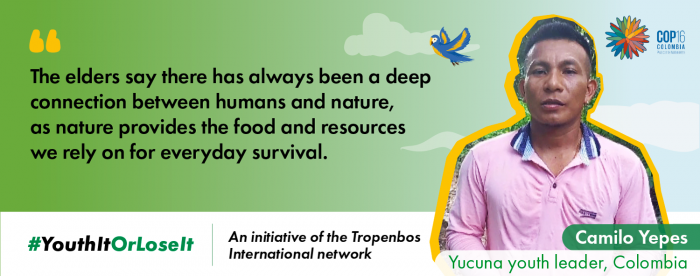News
Our stories ... ...

the Netherlands - 03 October, 2024
Camilo Yepes is a young Indigenous leader from the Yucuna people in Colombia. For several years, he has participated, together with other young people, in a process of strengthening traditional dances and songs led by grandparents and elders.
Through this process, Camilo has earned recognition as one of his community’s principal singers and plays an active role in the annual programme of traditional dances in the Lower Caquetá and Mirití Paraná regions. This experience has positioned him as a leader in his territory, inspiring other young people to rediscover, learn, and reinforce traditional dances, while also encouraging them to respect and maintain these cultural practices.
The knowledge of the ritual dances has enabled Camilo to share with his peers the importance of the healing aspect associated with the dances, which are vital for ecological management and the preservation of the territory.
In addition to his traditional education, Camilo has been trained in early childhood education and audiovisual production. He was a community teacher, and worked as a facilitator and educational agent of the Colombian Institute of Family Welfare (ICBF), accompanying children and parents. He participated as a dynamizer of the Sinchi Institute, characterizing the use of cultural practices in his community.
Camilo will be part of the COP 16 Event: Youth it or lose it! Traditional knowledge transmission for the sustainable use and conservation of biodiversity this October, 24th in Cali, Colombia. Get to know him through this interview.
Noticing that great leaders who had been managing various initiatives are scarce, because they are becoming elders or moving away for work opportunities, I realised the importance of preparing and training myself. In doing so, when the time comes, we, the younger generation, can step up to lead our community, strengthen our initiatives, and inspire others in our region to do the same. I have been actively involved in several activities, including meetings and discussions around the community management plan, which governs the protection of the territory and the environment.
The elders say there has always been a deep connection between humans and nature, as nature provides the food and resources we rely on for everyday survival. Without nature, we simply couldn’t exist. In light of the environmental and social changes we’ve witnessed, alongside the impact of globalisation, the elders’ message is clear: respect nature, conserve it, do not destroy it, cherish it, and stay connected to it so that we can live in harmony, ensuring that future generations—our children and young people—can enjoy its benefits as well.
The primary challenge we’re currently facing in our territory is climate change. It’s been nearly a month without rain, the creeks have dried up, and there’s nowhere left to bathe or collect water for daily needs and consumption. This is now the most pressing issue affecting us. Our elders and keepers of traditional knowledge have tried to prevent this, but it has proven extremely difficult. Times have changed drastically, and that makes everything much harder to manage.
It's really important because it gives us a chance to show how life is in our region, what challenges we’ve been facing as the world changes, what our most urgent needs are, and how things have changed over time. We can explain how modern life has affected us, the benefits it has brought, and how our way of living, traditions, and customs have evolved.
Since we’re a remote region, often forgotten by the government, this is a way for us to be heard, and hopefully get support to strengthen our processes, especially in protecting our knowledge and traditions. It’s also crucial for the care and management of biodiversity in our territory, which is home to the richest flora and fauna in the world. We believe it’s possible to build connections between Western and cultural approaches to help protect and strengthen our biodiversity.
I suggest that they support us through programmes, projects, and activities that inspire children and young people to take ownership of our territory so that we value it, respect it, and conserve it properly. They could also provide incentives to encourage young people to strengthen our environment and to stay in their territories living well.
Additionally, they could help spread awareness of our challenges to other organisations and national and international organisations.
It’s also essential to consider our elders, as they are the ones who help maintain harmony between nature and people through their ancestral knowledge.